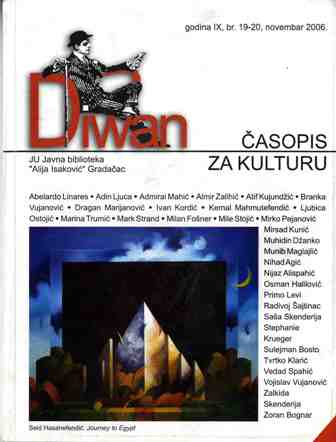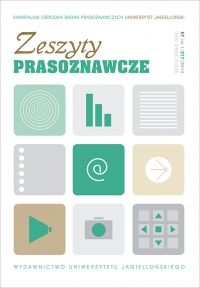


Keywords: literary study; Husein-kapetan Gradascevic; Zmaj od Bosne; Dragon of Bosnia; Nedžad Ibrišimović
Study about a writer Nedžad Ibrišimović and his major works about Husein-kapetan Gradascevic in his historical novels. That works are: the novel "Braća i veziri" /Brothers and vezirs/; drama and prose "Zmaj od Bosne"/Dragon of Bosnia/.Historical narratology is different from literature prose because the fiction of factual become aesthetic dimension.
More...
Keywords: poems
The Warrior's poem = Ratnikova pjesan; That wind you on the swing wobble = To vjetar te na mahove njiše; You pass away the wall and you outline yourself = Zidom prolaziš i ocrtavaš se; Neither a star has = Nikakve zvijezde nema; Human spreads arms = Čovjek širi ruke; A comment about turtle = Komentar o kornjači; The open house = Otvorena kuća; The house below the sky = Kuća pod nebom; Charlie Chaplin = Čarli Čaplin; The road out of landscape = Cesta izvan krajolika; Last days of Herceg Stjepan = Poslednji dani Herceg Stjepana; Again seeing of Herceg Stjepan = Ponovno viđenje Hercega Stjepana; The evening with Nihad = Večer s Nihadom; The poem for Nihad summer 1979 = Pjesma za Nihada ljeta 1979.; Sonnet for the Old bridge in Mostar = Sonet za stari most u Mostaru; Sonnet about a actor = Sonet o glumcu; Open the window, mother = Otvori prozor, majko; The wall of Jerusalem = Jeruzalemski zid
More...
Keywords: review; Esad Zgodić: "The Domination by Consensus" / Vladavina konsenzusom
Review of the new political book "The Domination by Consensus" by Esad Zgodic.
More...
Keywords: Application; literature award
More...
Keywords: poetical-genre research; literary study; Husein-kapetan Gradascevic; libretto for opera; Dragon of Bosnia; Zmaj od Bosne
Own penmanship experience in poetical-genre research literature character and historical figure of Husein-kapetan Gradascevic is study about author's experience during his effort to write about him. This figure was inspirations for two stories and own novel "Arlekin" by Nijaz Alispahić and drama "Dragon of Bosnia" /Zmaj od Bosne/. Author gave us short fragment of his libretto for opera with same name "Dragon of Bosnia".
More...

Keywords: art criticism; review; exibition; Seid Hasanefendić; painting
Art criticism about the exibition of painitngs by Seid Hasanefendić, who opened on the Literary meeting Gradacac, 26.6.2006.
More...
Keywords: Judaic study; Primo Levi (1919-1987); literary study;
Literary study about Italian Jew and writer Primo Levi.
More...
Keywords: literary study; Husein-kapetan Gradascevic; oral literature
Study about heroic figure of Husein-kapetan Gradascevic in Bosnian oral literature. Question of this study is: why are the great heros of history becoming so small hero in prose? Indolence of oral bard according to history is evident because hi decided who become hero in oral epics.
More...


Keywords: review; Sejfo Šarić: "The Bosnian's tragedy; causes and outcomes"/ Bosanska tragedija; uzroci i posljedice
Review of the book "The Bosnian's tragedy, causes and outcomes" by Sejfo Šaric, published in Gradacac, 2005.
More...

Keywords: art criticism; exhibition; Dragana Nuić-Vučković; painting
Art criticism of exhibition of painting by Dragana Nuić-Vučković in Art Gallery "Roman Petrovic", Sarajevo, September 2006.
More...
Keywords: prose; fiction; travel literature
More...
Keywords: censorship; October ’56; newspapers; Poznan
The purpose of the article is to point out the outlook of Local Censorship Office in Poznań to articles about political changes in Poland in 1956, which were published in Gazeta Poznańska. The previous research on the attitude of the press and censorship during the “Polish October” focused primarily on newspapers which were considered revisionist. Gazeta Poznańska was edited by Regional Committee of the Polish United Workers` Party and presented an official conservative point of view. The article was based on the documents from State Archive in Poznań. The basis of arrangements presented in the article were the result of the analysis of source documents created by Local Censorship Office in Poznań. They made it possible to create a category of texts which were consistently excluded from publication. This group included articles on the increase in wages and focused on the movements of Soviet troops in Poland. Censorship also blocked opinions that evaluated the earlier period of the Communist Party governments too critically and suggested dissatisfaction with the ongoing changes. The activity of censorship in Gazeta Poznańska in the year 1956 also indicates what type and level f criticism of the Communist Party at that time was considered to be admissible. The outlook of Local Censorship Office in Poznań to Gazeta Poznańska in the period of 1956 changes in Poland showed what type and level of criticism was acceptable in the Polish United Workers’ Party’s press.
More...
Keywords: mass media; media influence; penal populism; criminal law; pedophilia
On November 5th, 2009, the Polish Parliament passed an amendment to the Penal Code, introducing a new preventive measure against pedophilia perpetrators, commonly known as chemical castration. The amended Article 95a, section 1a of the Penal Code concerns, among others, a mandatory referral of the perpetrator of rape of a minor under the age of 15 to outpatient treatment or placement in a closed institution, where they will undergo pharmacological and psychotherapeutic treatment aimed at reducing sex drive. The amendment has been widely criticized by professionals; doctors, sexologists, and criminologists, who underlined ineffectiveness and possible adverse health consequences of the so-called chemical castration, not to mention how its mandatory nature violates the basic rights of the individual. Nevertheless, this law has an extremely large popular support: according to a Millward Brown SMG / KRC survey lab, 79% of Poles approved of the amendment. It is also worth noting that the first announcement of the introduction of the above-mentioned Act took place on September 9th, 2008, and thus on the same day on which the media revealed the so-called Polish Fritzl case, whose perpetrator, Krzysztof B. is currently held imprisoned for sexual abuse of his daughter. The topic of this paper is to answer whether and to what extent the introduction of the so-called ‚chemical castration act’ was infl uenced by the phenomenon of penal populism, and what the role played by media was in this process. It is a research attempt to determine how the Polish media report the allegations of pedophilia crimes and whether the manner of reporting could have infl uenced the public opinion about this kind of crimes and the political decisions about the employed ways of combating it.
More...
Keywords: media management; ethical and legal rudiments of media organizations; Watergate scandal
The article discusses ethical and legal conditions referring to media management. The following thesis is discussed: tendency for manipulative behaviors in the media is conditioned primarily by needs. Their expressions are rather independent from socio-economic system. For the purpose of proving the thesis the case study analysis was applied, including Watergate scandal, being the most substantial one and perceived widely as acknowledgment of the power of American democracy. The author proves that it is a faulty belief. An alternate element that proves the rightness of the assumed thesis is the analysis of legal documents referring to media institutions and deontological codes accepted by journalist associations.
More...
Keywords: local media in Poland; the Internet; printed press; electronic press
Apart from TV digitization the Internet and local press have been the most important events in the Polish media in the recent years. The former has been developing very intensively, the latter, which exists in the traditional form, for many years has been said to be bound to fall due to the Internet itself. But it is still doing quite well and has more and more in common with the Internet. Local communication as well as regional or national ones seem to be exceeding the limited territorial environment more and more and getting transferred to the global network with better and better results. Many publishers offer subscriptions and e-copy sales releases. On the other hand, the local printed press has still priority over the virtual media in many communities. These are the theses which the author tries to prove through the analysis of the selected local newspapers. Among them there are both local weeklies-the best-selling in the country, and short-run periodicals, especially popular in smaller towns and villages. Some of them are still very traditional and they use paper as the only carrier transfer. It mainly concerns the press of a very small range. One can clearly observe that the smaller the community, the greater the role of the traditional print media. However, it is difficult to notice the relationship between the time of launching the new titles and their form. The recent ones are not necessarily the most multimedia ones.
More...